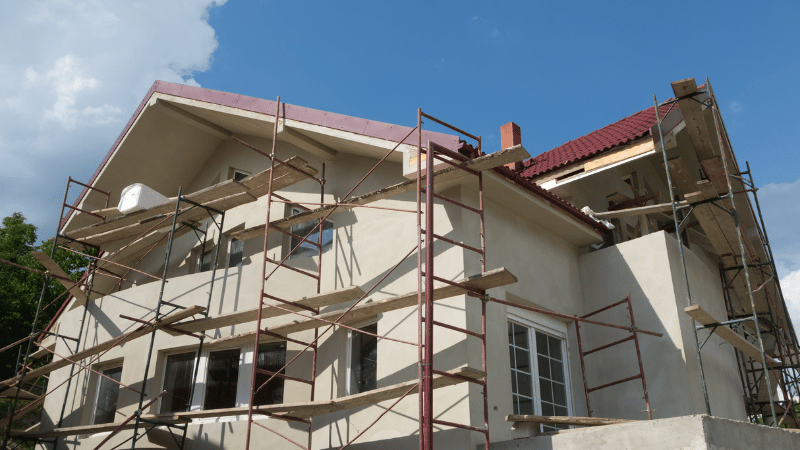Categories
NEWS: How Much Will My Mortgage Go Up in 2024?

If you're remortgaging in 2024, your mortgage payments could go up by as much as £500 - £1000 a month.
For the best part of this year, mortgage rates have been hovering around 5%, far higher than the record-low rates seen in 2021. Given these figures, you may wonder how your household will be affected and how best to prepare for switching to a new fixed rate in 2024.
After over a decade of low interest rates, the Bank of England base rate saw a steep increase between 2021 and 2023. Many economists believe we could see a drop in mortgage rates before the year is out, namely due to inflation being back to the Bank of England's 2% target.
The Bank of England base rate has been static at 5.25% since August 2023, and once it drops, mortgage interest rates are likely to follow suit. Homeowners who secured low fixed rates between 2020 - 2022 are anticipating news on the bank rate in hopes that they can remortgage to a lower rate than we're currently seeing. However, it is possible that there won't be significant mortgage rate reductions until later in the year.
In this post, we offer an overview of your elevated costs, explain when and why mortgage rate increases occur, and what you can do to mitigate rising payments in 2024.
Get a Quote
How Much Are Mortgages Going Up?
Why Do Mortgages Get More Expensive?
How Can I Make My Mortgage Cheaper?
Looking for a New Mortgage Deal in 2024?
How Much Will My Mortgage Go Up?
There is no catch-all figure, as mortgage repayments from varying households will differ – it's a broad range and depends mainly on your mortgage type.
However, looking at data from the BoE (Bank of England) points to an increase in the average household's monthly mortgage payments in line with current inflation.
At the end of June 2022, mortgage payments accounted for around 12% of average pre-tax income. And now, that figure has increased to 17%.
The average mortgage interest rate in 2021 was roughly 2.5%. Rates have doubled since then, and while a drop is expected in the coming months, those due to remortgage are understandably perturbed regarding a foreseen increase in payments.
Fixed mortgage rates differ depending on the state of the market, your credit score, and your overall financial situation, so it's difficult to produce an exact figure. However, fixed rates have doubled since 2021, so it wouldn't be outlandish to expect your mortgage interest rates to double.
How it works
Imagine you bought a house for £280,000 in 2019 on a five-year fix. You had a 10% deposit, and your interest rate was 2%.
To calculate your monthly interest, you can use the formula below:
In this scenario, you would have been paying approximately £420 interest for the duration of your five-year fix, plus capital repayments (which typically begin as less than the interest payments and then balloon as you build equity in your property).
By 2024, it's time to remortgage. You've built some equity in your property, but the average fixed rate is now 5.5%.
It's possible that you'll have paid off around £30,000 of your total mortgage amount during this time. You'll need to remove this from your total loan amount to calculate your new monthly interest payments.
It's worth noting that the calculations above are estimates based on averages from each year. For an accurate idea of what to expect when you remortgage, it's worth seeking guidance from an experienced mortgage broker.
A good mortgage broker can advise you on the best route to take and ensure you get the best deal when remortgaging.
Related: NEWS: Are mortgage rates going down?
Interest Calculator
Use our mortgage interest calculator below to get a rough idea of what interest payments to expect.
Mortgage Calculator
Your repayments
Based on the figures entered, we think your mortgage will cost:
Repayment: (Capital & Interest)
Interest Only:
This information is computer-generated. It has only been designed to give a useful general indication of costs. Make sure that you read the separate key facts lender illustration before you make a decision. To get a full mortgage quote contact us.
Why Do Mortgages Get More Expensive?
Mortgage rates can vary greatly depending on the type of loan, the lender, and the current market conditions.
You'll likely see increases in mortgage payments in 2024 – whether you're refinancing to a new deal or defaulting to your bank's standard variable rate (SVR) - because interest rates have gone up.
Mortgage rates have steadily risen since the beginning of 2021, but the exact increase for your mortgage will depend on your specific loan and lender.
Here are some key factors that can make your mortgage more expensive if you're looking to refinance:
- Credit score - Usually, the lower your credit score, the higher your interest rate, so if your score has changed since your last mortgage deal, it could make your mortgage more expensive.
- Mortgage type - Some loan types, such as variable-rate mortgages, may have lower interest rates initially but can become more expensive over time as the interest rate adjusts to the BoE base rate – more on this later.
- Deposit / Loan to Value - Generally, the more deposit you can put down, the lower interest rates you'll pay, as it's less risky for your lender
- Fees - Lenders charge fees for originating, underwriting, and servicing your mortgage. These fees can add to the overall cost of your loan.
You can see how the mortgage market has changed in the last two years:
March 2022
|
Term
|
Product
|
Type
|
LTV
|
Rate
|
Subsequent Rate
|
Product Fee
|
ERC
|
|
2 years
|
Fixed
|
Purchase
|
60%
|
1.49%
|
4.9%
|
£999
|
Yes
|
|
5 years
|
Fixed
|
Remortgage
|
60%
|
1.89%
|
3.99%
|
£1495
|
Yes
|
|
10 years
|
Fixed
|
Remortgage
|
75%
|
2.46%
|
3.99%
|
£995
|
Yes
|
November 2022
|
Term
|
Product
|
Type
|
LTV
|
Rate
|
Subsequent Rate
|
Product Fee
|
ERC
|
|
2 years
|
Fixed
|
Purchase
|
60%
|
3.60%
|
6.49%
|
£999
|
Yes
|
|
5 years
|
Fixed
|
Remortgage
|
60%
|
4.83%
|
6.24%
|
£995
|
Yes
|
|
10 years
|
Fixed
|
Remortgage
|
75%
|
4.89%
|
5.5%
|
£995
|
Yes
|
March 2023
|
Term
|
Product
|
Type
|
LTV
|
Rate
|
Subsequent Rate
|
Product Fee
|
ERC
|
|
2 years
|
Fixed
|
Purchase
|
60%
|
4.14%
|
7.49%
|
£999
|
No
|
|
5 years
|
Fixed
|
Remortgage
|
60%
|
3.89%
|
7.49%
|
£999
|
Yes
|
|
10 years
|
Fixed
|
Remortgage
|
75%
|
4.04%
|
7.49%
|
£999
|
Yes
|
September 2023
|
Term
|
Product
|
Type
|
LTV
|
Rate
|
Subsequent Rate
|
Product Fee
|
ERC
|
|
2 years
|
Tracker
|
Purchase
|
60%
|
5.39%
|
8.4%
|
£999.00
|
No
|
|
5 years
|
Fixed
|
Remortgage
|
60%
|
5.12%
|
6.9%
|
£490.00
|
Yes
|
|
10 years
|
Fixed
|
Remortgage
|
75%
|
4.91%
|
6.2%
|
£999.00
|
Yes
|
March 2024
|
Term
|
Product
|
Type
|
LTV
|
Rate
|
Subsequent Rate
|
Product Fee
|
ERC
|
|
2 years
|
Tracker
|
Purchase
|
60%
|
4.44%
|
8.74%
|
£0
|
No
|
|
5 years
|
Fixed
|
Remortgage
|
60%
|
4.24%
|
7.99%
|
£490.00
|
Yes
|
|
10 years
|
Fixed
|
Remortgage
|
75%
|
4.63%
|
7.99%
|
£999.00
|
Yes
|
Source: Moneyfacts
Related: How do mortgage interest rates work?
How Can I Make My Mortgage Cheaper?
Different lenders may offer different mortgage rates, so it pays to shop around and compare offers from multiple lenders.
If you plan on remortgaging in 2024, weigh up your options – a mortgage broker can help; they can give you access to the whole of the market, the best products, and whether a fixed-rate mortgage or a tracker mortgage is best for you.
Here are some more general points to help mitigate expensive mortgage payments to better suit your financial circumstances in 2024:
- Fixed-rate mortgage/variable-rate mortgage – A variable-rate mortgage, or tracker mortgage, may have a lower initial interest rate but can increase over time. A fixed-rate mortgage has a consistent interest rate over the deal's life, which can be more predictable and potentially cheaper in the long run.
- Put down a bigger deposit - A larger deposit can lower your mortgage rate and reduce your payments
- Improve your credit score - A higher credit score can help you qualify for a lower mortgage rate
- Make additional repayments - Making additional payments towards the capital balance of your loan can help you pay off your loan faster, meaning you're not paying interest for as long
It's important to note that your mortgage interest payments could double if you're looking to refinance and seek a new fixed-rate mortgage. This is something to consider when entering into a new deal.
The rise in interest rates has primarily affected those refinancing to a new fixed-rate mortgage. In contrast, those refinancing to a new variable-rate mortgage will have seen less of an impact on their monthly mortgage payments.
This is because banks need to protect themselves from rising interest rates in the UK. If rates go up, but your fixed rate stays the same, they need a buffer to offset their risks. This is why a fixed rate generally starts as more expensive than a variable rate.
If you need clarification on what's best for you, you can consult an expert mortgage broker to evaluate your circumstances better and understand your options.
Related: Fixed rate mortgage or tracker - which is best?
Here are some recent rates we've secured for our clients:
2 Year Tracker Subsequent rate 6.99% LTV - 60% Product Fee £999 Free standard valuation Early redemption charges As of 10th January 2024 5 Year Fixed (Remortgage) Subsequent rate 6.25% LTV - 60% Product Fee £999 Early redemption charges As of 10th January 2024 2 Year Fixed (Remortgage) Subsequent rate 6.25% LTV - 60% Product Fee £999 Early redemption charges As of 10th January 2024 Thank You for your interest - please complete the form below and a member of our team will be in contact.2 Year Tracker
Up To £5m
4.94% APR
APRC 8.4%*
5 Year Fixed
Up To £1.5m
3.89% APR
APRC 6.1%*
2 Year Fixed
Up To £1.5m
4.44% APR
APRC 6.1%*
Contact Us
*Overall Cost For Comparison
Read blog: First Time Buyers Dominating London Market
When Will My Mortgage Go Up?
When a mortgage payment increases will depend on your mortgage.
Check your current policy documents to see when your deal ends and what happens when it does.
If you're due to revert to your bank's SVR, think about taking out a new deal instead - generally, you'll pay much higher interest on an SVR rate compared to a fixed or variable rate deal.
Refinancing to a new deal will likely see you pay higher rates as fixed-rate mortgage deals are adjusted to reflect the current interest rates of our time.
For example, if you had previously been on a fixed-rate deal for several years, you may have been paying lower interest rates. When this ends, you'll likely refinance to a more expensive deal than you previously paid.
If you're currently on a tracker mortgage instead, your interest will rise based on the movement of the base interest rate set by the BoE—conversely, you'll pay less interest if the base rate drops.
Whether you're refinancing to a new fixed-rate mortgage or a variable-rate mortgage, you'll likely see mortgage payments rise, so it's best to weigh up your options carefully and choose a product that best suits you with the help of an expert mortgage broker.
Additionally, you should review the terms of your mortgage product and be aware of any factors that could increase monthly payments further or look to some of the methods listed above to mitigate some of the costs.
Watch our video on early remortgaging and how to get a better deal below.
Looking For a New Mortgage Deal in 2024?
If you're looking to refinance in 2024, our team of experienced mortgage advisors can help you compare different mortgage products and find the best deal for your circumstances.
We provide advice on the best way to structure your mortgage and help you understand the many options available to you across the whole market.
We can compare rates on numerous products, get you access to specialist lenders, and negotiate lower interest rates available in 2024 for a mortgage product that best suits you.
To see what we can do for you, call us on 0117 959 5094 or book a free consultation below.









